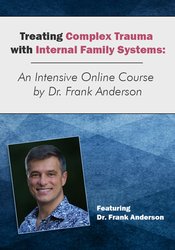Dr. Frank Anderson – Treating Complex Trauma with Internal Family Systems
$300 Original price was: $300.$54Current price is: $54.
Shopping Instructions:
- DISCOUNT 15% : SHOP15
- Product Delivery: Within 1 – 12 hours after purchase.
After decades of clinical breakthroughs and scientific research, the Internal Family Systems model has been shown to be effective for healing even the most complex trauma.
Dr. Frank Anderson – Treating Complex Trauma with Internal Family Systems
Add additional power to your current clinical approach and make trauma treatment more effective in a short period of time when you incorporate Internal Family Systems (IFS) in your practice.
Join Dr. Frank Anderson, psychiatrist, author, and vice chair of the Foundation for Self Leadership — the leading organization dedicated to advancing the IFS model through research and training — in this comprehensive online course where he will give you a step–by–step guide for applying IFS into your clinical practice.
Throughout the online course, special emphasis will be given to understanding how trauma affects the brain and how you can use IFS to heal complex trauma and its common co-morbidities, including anxiety, depression, panic, insomnia, obsessive-compulsive behavior, and more.
You’ll also get exclusive insight on how neuroscience can inform why, how and what IFS techniques you should use to maximize your clinical outcomes — so you’ll know exactly how to empower your clients to overcome even the most complex traumas.
Learning IFS has never been easier — revolutionize your clinical approach and help your clients heal!
You’ll end this intensive online course prepared to start integrating Internal Family Systems with your current clinical models, plus you’ll earn 14 CE hours towards your IFS Certification.
An Intensive Online Course by Dr. Frank Anderson
You’ve likely heard your clients explain their feelings of conflicting emotions, “a part of me wants to…and then there’s a part of me that doesn’t…” as they grapple with their internal “Self,” desires, and behaviors.
With the transformative IFS approach, the idea of multiplicity of the mind is normal. Every part has a good intention, and every part has value. Even for trauma survivors.
Through engaging case studies, in-session demonstrations, and masterfully presented lectures, Dr. Frank Anderson will show you step-by-step how to apply the most effective, empirically-validated IFS interventions to help your clients listen to and understand their conflicting parts to master their emotions — so they can discover deep, lasting healing.
- Accelerate the healing from complex trauma by integrating the IFS model into your current clinical practice
- Improve assessment and treatment planning with tools to help identify, specify, and clarify the protective parts of clients with trauma histories
- Protect clients from emotional and psychological pain by offering an alternate view of symptoms and psychopathology that shows clients how parts are trying to protect them
- Showcase a non-pathological perspective of mental health disorders by demonstrating how IFS translates common comorbidities into parts language
- Increase your curious and compassionate self when using IFS to work with clients who have trauma histories.
- Improve clinical outcomes by learning how to differentiate between therapeutic and biological conditions.
- Heal clients’ traumatic wounds through the unique IFS internal attachment model.
- Handle extreme symptoms of trauma by determining if they are rooted in sympathetic activation or parasympathetic withdrawal.
- Gain quicker access to your client’s traumatic vulnerabilities through IFS specific therapeutic techniques that shift arousal and withdrawal.
- Use neuroscience to inform your therapeutic decision–making so you’ll know exactly what tool or strategy to use to help your clients heal.
- Integrate IFS with your current treatment approaches including EMDR, DBT, and Sensorimotor Psychotherapy.
– Janina Fisher, PhD
- Acute trauma
- PTSD
- Complex or relational trauma
- Developmental and attachment traumas
- Extreme or dissociative trauma
- The origins, goals & assumptions
- A non-pathologizing, accelerated approach, rooted in neuroscience
- How IFS differs from phase-oriented treatmentMultiplicity of the mind — we all have parts
- The importance of our protective responses
- Dealing with emotional overwhelm head-on
- Clinical considerations for clients experiencing abuse
- Step 1: Identify the Target Symptom
- Applying meditation practices
- Separating the person (self) from the symptom
- Learning about its intention
- Step 2: Gain Access to Internal Strengths & Resources for Healing
- Moving from defensiveness to curiosity
- The “Self” of the therapist-countertransference redefined
- Accessing compassion to open the pathways toward healing
- Role of empathy in healing — the benefits and the downsides
- Step 3: Find the Fear and Function of the Symptom
- Focusing on its fear
- The real story behind the symptom
- Fostering the internal relationship
- Step 4: Healing of Traumatic Wounds
- Three phases to healing: Witness the pain, remove the wounded part out of the past, and let go of the feelings, thoughts and beliefs
- Science behind the healing — memory reconsolidation
- IFS as internal attachment work
- Attachment styles as parts of self
- Attachment trauma — the role of the therapist
- Heal relational wounds of childhood
- Client’s “Self” as the corrective object
- Work with preverbal trauma
- Depression, panic attacks, substance abuse, eating disorders, ADD and OCD
- A non-pathological approach
- Comorbidities as protective responses to trauma
- Symptoms as “parts of the self”
- Intersection of biology and situation (“Real Mind-Body Medicine”)
- Therapist’s role in biology — When to refer and when to work it through
- Psychotherapy of psychopharmacology
- Neuroscience for therapists — what you need to know
- Fear circuitry and the development of PTSD
- Extreme reactions and Autonomic Nervous System
- Rage to suicide and dissociation to shame
- Talking directly to the symptom
- Introducing the part to the “Self”
- Dealing with the overwhelm — no need for building resources
- How to stay clear and calm while working with clients in extreme states
- Top-down and bottom-up strategies rooted in neuroscience
- When it’s necessary to take over and “be the auxiliary brain” for your client
- When it’s best to slow things down, hand over control and work with the body
- Sensing vs. making sense of things
- At home strategies
- EMDR, DBT, Sensorimotor/SE and other methods
- Transformation vs adaptation or rehabilitation
- Going beyond the cognitive (experiential therapies)
- Integrating IFS with your current clinical approach
- Live demonstrations
- Meditations
- Practice sessions
It’s easy to get shaken and lose confidence in your approach when a client’s trauma response edges into seemingly uncontrollable dynamics of rage, panic, or suicidal desperation.
In this bonus session, you’ll explore the neurobiological “whats and whys” of hyperarousal, parasympathetic withdrawal, and the underlying symptoms. You’ll also learn how to use neuroscience to inform you treatment model — so you’ll know exactly how to empower your clients with strategies that help produce deep, lasting healing.
Bonus 2: PDF Download | Internal Family Systems Skills Training Manual: Trauma-Informed Treatment for Anxiety, Depression, PTSD & Substance Abuse
This comprehensive manual, complete with downloadable exercises and worksheets, offers straight–forward explanations to help teach clients a new way to identify with their “Self” — separating the person from the symptom to gain control over traumatic experiences. You’ll get:
- Step-by-step techniques
- Annotated case examples
- Unique meditations
- Neuroscience applications
- …and so much more!
Frank Guastella Anderson, MD, completed his residency and was a clinical instructor in psychiatry at Harvard Medical School. He is both a psychiatrist and psychotherapist. He specializes in the treatment of trauma and dissociation and is passionate about teaching brain-based psychotherapy and integrating current neuroscience knowledge with the IFS model of therapy.
Dr. Anderson is the vice chair of the Foundation for Self Leadership. He is a trainer at the Center for Self Leadership with Richard Schwartz, Ph.D., and maintains a long affiliation with, and trains for, Bessel van der Kolk’s Trauma Center at Justice Resource Center in Boston, MA.
Dr. Anderson has lectured extensively on the Neurobiology of PTSD and Dissociation and wrote the chapter “Who’s Taking What” Connecting Neuroscience, Psychopharmacology and Internal Family Systems for Trauma in Internal Family Systems Therapy-New Dimensions. He co-authored a chapter on “What IFS Brings to Trauma Treatment in Innovations and Elaborations in Internal Family Systems Therapy” and recently co-authored “Internal Family Systems Skills Training Manual.”
Dr. Anderson maintains a private practice in Concord, MA, and serves as an Advisor to the International Association of Trauma Professionals (IATP).
Download Dr. Frank Anderson – Treating Complex Trauma with Internal Family Systems right now on AMZlibrary.com !
Here’s What You’ll Get in Dr. Frank Anderson – Treating Complex Trauma with Internal Family Systems
Dr. Frank Anderson – Treating Complex Trauma with Internal Family Systems : Sample
Related products
Business & Sales
Business & Sales
Internet Marketing
Internet Marketing
Business & Sales
Business & Sales
Dan Kennedy (GKIC) – The Source Code to Business Success and Advanced Wealth Attraction
Business & Sales













